Key takeaways:
- High-Performance Computing (HPC) utilizes supercomputers and parallel processing to solve complex problems quickly, enhancing fields like climate modeling and personalized medicine.
- Data is crucial for HPC; it shapes research outcomes and innovations, with proper management and analysis being essential for meaningful results.
- Collaboration among multidisciplinary teams enhances data handling and problem-solving in HPC, turning raw data into impactful insights.
- Adaptability, thorough testing, and community engagement are vital lessons learned from HPC experiences, helping navigate challenges and drive success.
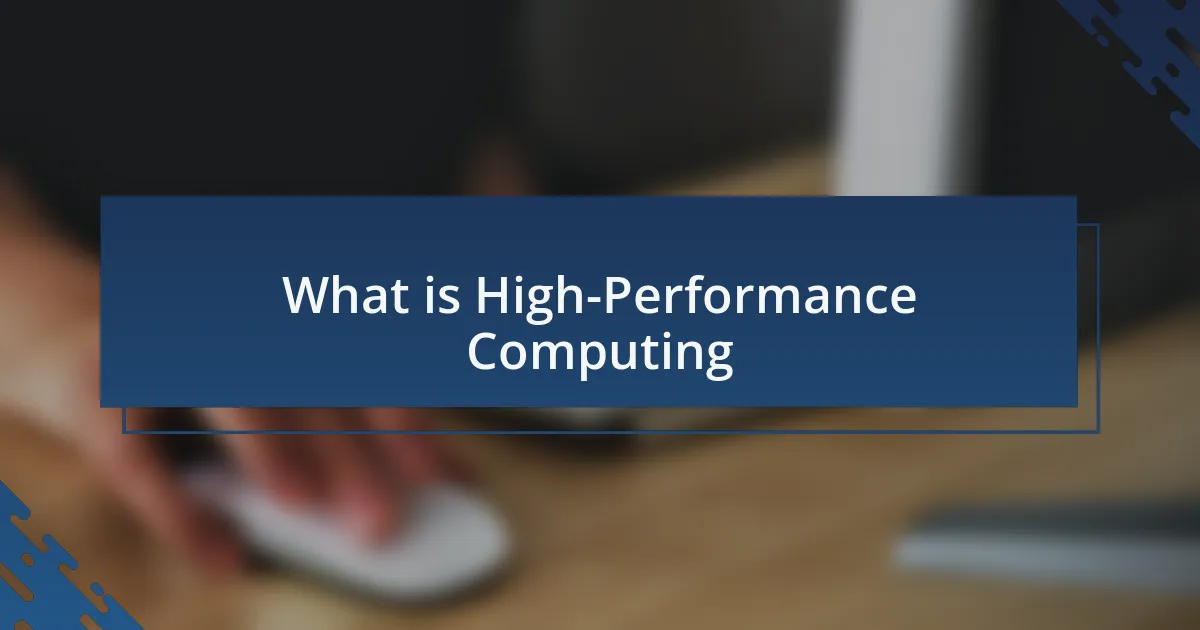
What is High Performance Computing
High-Performance Computing, or HPC, refers to the use of supercomputers and parallel processing techniques to solve complex computational problems at unprecedented speeds. I remember my first encounter with HPC—standing in front of a massive supercomputer, I was awestruck by its potential to crunch data that would take traditional computers weeks to process. Have you ever imagined what it would be like if problems we consider insurmountable could be solved in just hours?
Essentially, HPC harnesses the power of multiple processors working together, enabling scientists, researchers, and engineers to run simulations and analyze vast datasets efficiently. Just the other day, while simulating climate models, I realized how crucial HPC is for drawing insights that influence critical decisions, like natural disaster preparedness. It’s remarkable how this technology can shift our understanding in fields ranging from astrophysics to molecular biology.
At its core, HPC is about tackling the “big data” challenges we face today—the kind of problems requiring not just speed but also precision. I often find myself pondering: how would our world change if we consistently utilized HPC for societal issues? The insights gained through high-performance computing can provide answers that propel innovation and foster scientific breakthroughs, something I deeply value in my work.
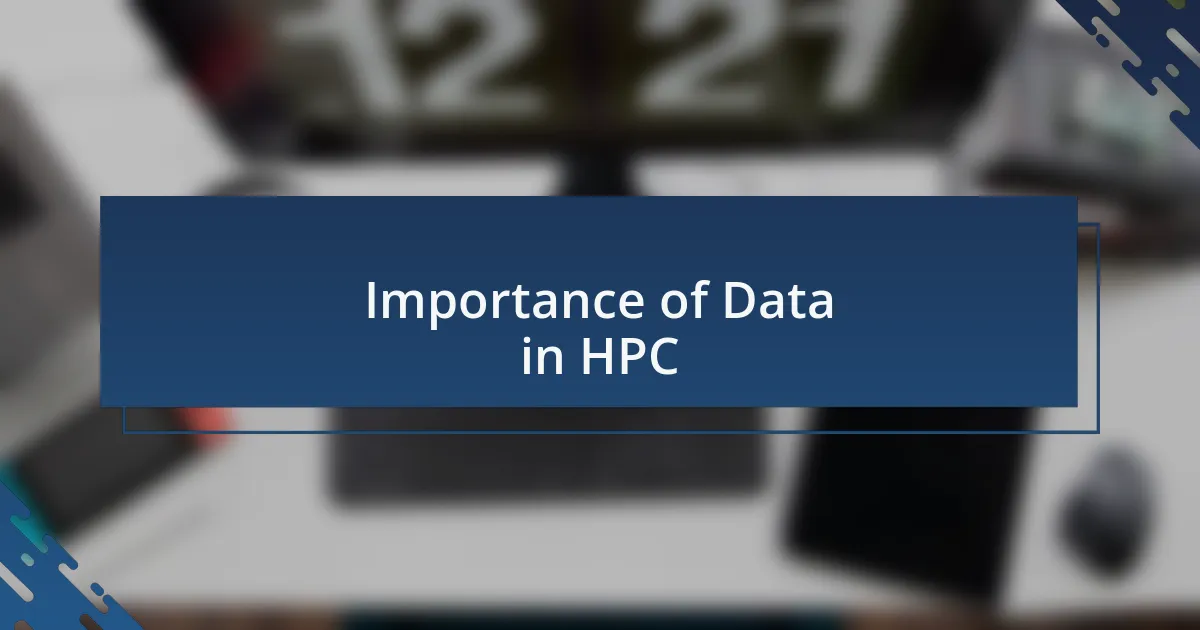
Importance of Data in HPC
Data is the lifeblood of High-Performance Computing; without it, the advanced capabilities of supercomputers would remain dormant. I remember working on a project that required analyzing genomic sequences—terabytes of data swirled around me, and I realized just how pivotal those datasets were in unlocking breakthroughs in personalized medicine. In moments like those, it hits me: the significance of data isn’t just quantitative, it’s qualitative, shaping the very future of research and innovation.
As someone who frequently collaborates with computational scientists, I’ve witnessed firsthand how the right data can transform hypotheses into concrete results. Once, during a modeling simulation for air quality, we manipulated various datasets, and the results provided staggering insights that led to actionable changes in public policy. Have you ever considered how the effectiveness of our environmental protections hinges on the data we analyze?
Moreover, the challenge of managing, processing, and interpreting data in HPC can’t be overstated. It’s exhilarating yet daunting; every time I optimize code for better data handling, I feel I’m not just solving a problem, but also bringing a step closer to cleaner, smarter technologies. Reflecting on my experiences, I can’t help but ask: how much more knowledge waits to be uncovered through improved data utilization in high-performance computing?
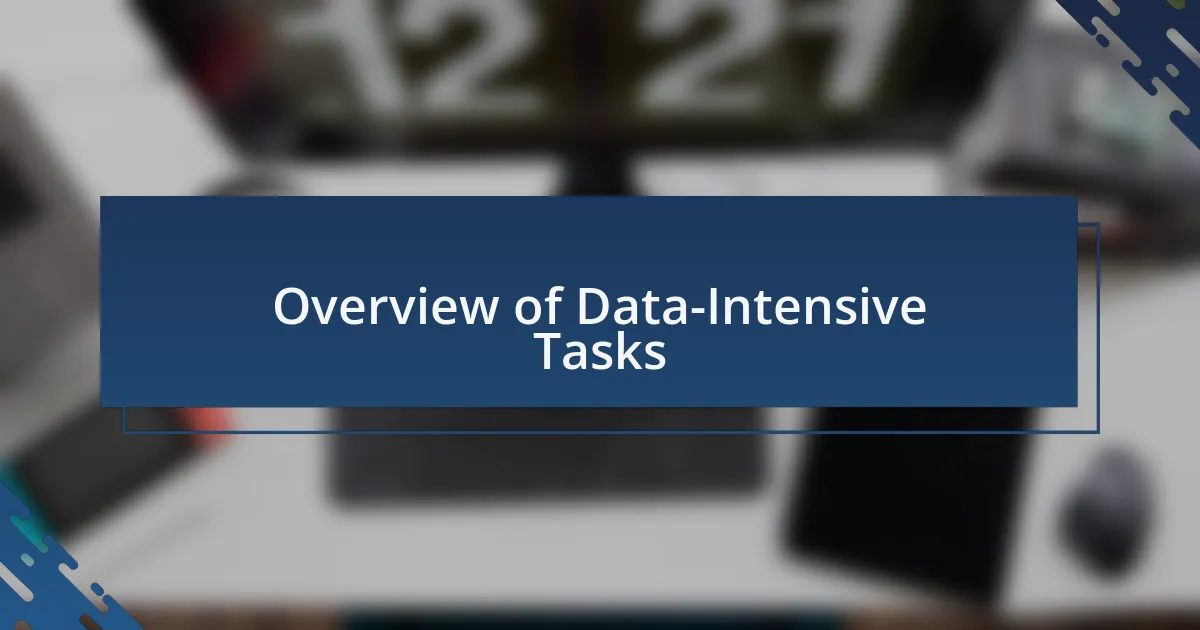
Overview of Data-Intensive Tasks
Data-intensive tasks in High-Performance Computing (HPC) often revolve around colossal datasets that require specialized techniques for processing and analysis. I recall a time when I was tasked with a project focused on climate modeling, where the sheer volume of data—from satellite imagery to atmospheric readings—was staggering. It made me realize that without efficient data handling methods, even the most powerful supercomputer could struggle to yield meaningful results.
As I delved deeper into this realm, I identified distinct types of data-intensive operations that regularly challenge HPC practitioners. For instance, I spent countless hours refining data pipelines for large-scale simulations, an endeavor that demanded not just technical skills, but also a creative approach to data visualization. Have you ever managed large datasets and felt an overwhelming sense of satisfaction when the visualizations finally clicked? It’s in those moments that the intricacies of data come to life, making the hard work feel incredibly worthwhile.
Moreover, I’ve observed that the success of data-intensive tasks hinges not just on hardware capabilities, but also on collaboration among multidisciplinary teams. I remember collaborating with statisticians and data scientists, each bringing their unique perspectives to the table. This synergy allowed us to tackle complex datasets more effectively. Isn’t it fascinating how teamwork can turn raw data into impactful insights? The potential to solve global challenges is immense when diverse minds unite over a common goal of harnessing data.

Tools for HPC Data Management
When managing data in HPC, tools like Apache Hadoop and Spark have become indispensable in my experience. I remember working on a genome sequencing project where the scalability of these tools made a world of difference. Are you familiar with how distributed computing can enhance data processing? It’s quite empowering to see how these frameworks manage massive datasets in parallel, significantly reducing the time spent waiting for results.
Another tool that I find incredibly valuable is SLURM, which orchestrates job scheduling in high-performance environments. I once faced a bottleneck during a simulation run that threatened to derail our project timeline. Implementing SLURM allowed us to prioritize tasks and effectively allocate resources. Have you ever experienced a moment of relief when the right tool comes along to streamline your workflow? It’s those little victories that keep us motivated in the world of HPC.
Finally, I can’t stress enough the importance of data management systems like Ceph or Lustre. During a recent astrophysics collaboration, the ability to access and share vast amounts of data seamlessly transformed our analysis process. What’s your go-to strategy for ensuring data integrity and accessibility? In my case, investing in robust data management solutions not only simplified our operations but also fostered a collaborative environment where breakthroughs felt just a heartbeat away.

My Strategies for Handling Data
When it comes to handling data in HPC, I often lean on effective data preprocessing techniques. For instance, during a recent climate modeling project, I found that cleaning and normalizing the raw data ahead of time saved us countless hours in computation. Have you ever noticed how a small adjustment at the beginning of a process can lead to exponential improvements later on? It’s like setting the right foundation for a building; everything else flows more seamlessly.
One strategy that I frequently employ is to divide datasets into manageable chunks. While working on a machine learning task related to image recognition, I discovered that processing smaller batches allowed our GPU resources to run more efficiently. It not only reduced the risk of overload but also gave me the chance to monitor performance more closely. Doesn’t it feel rewarding when a strategy leads to clearer insights? That sense of control can make all the difference.
Collaboration with colleagues also plays a crucial role in my data handling approach. I’ve experienced cases where discussing data structures and algorithms with peers brought forth innovative solutions I never would have considered alone. Have you ever engaged in a brainstorming session that completely shifted your perspective? Those moments aren’t just productive; they foster an environment of creativity and shared knowledge, making the challenges of high-performance computing feel a bit lighter.
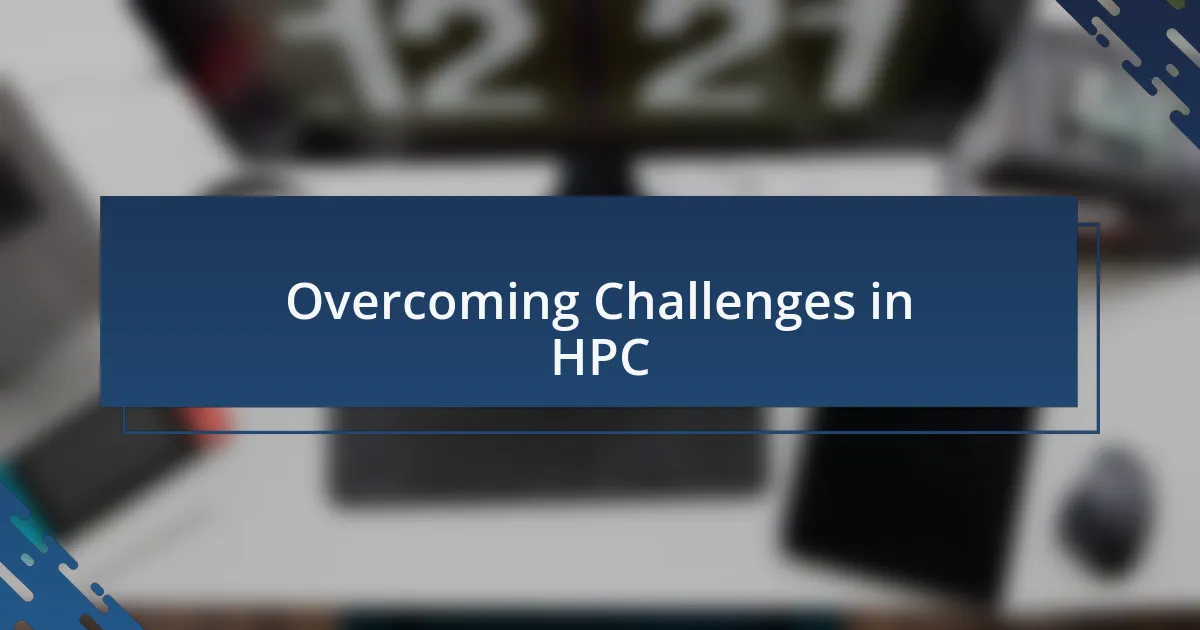
Overcoming Challenges in HPC
Navigating the challenges of high-performance computing can be daunting, particularly when dealing with vast data volumes. I recall a project on genomic analysis where we faced memory limitations that threatened our entire processing timeline. By proactively optimizing our resource allocation and leveraging cloud storage, we not only circumvented a potential disaster but also discovered a more scalable approach that enhanced our future projects. Have you ever turned a limitation into a strength? It can be an enlightening experience.
Another significant hurdle I’ve encountered is the complexity of hardware compatibility. During a large-scale simulation, I faced unexpected conflicts between different components in our computing cluster. After some trial and error, I realized that maintaining documentation and implementing a standardized configuration protocol could significantly reduce these compatibility issues. Isn’t it fascinating how a little organization can save us from headaches down the line?
I’ve also learned that the human element cannot be understated. I was once in a scenario where a critical error in code went unnoticed until the final stages of a project. However, by establishing regular check-ins and peer code reviews, I cultivated a collaborative atmosphere that led to early detection of such pitfalls. Doesn’t it feel empowering to create a safety net among your team? Building that trust and open communication not only mitigates risk but also transforms challenges into opportunities for growth.
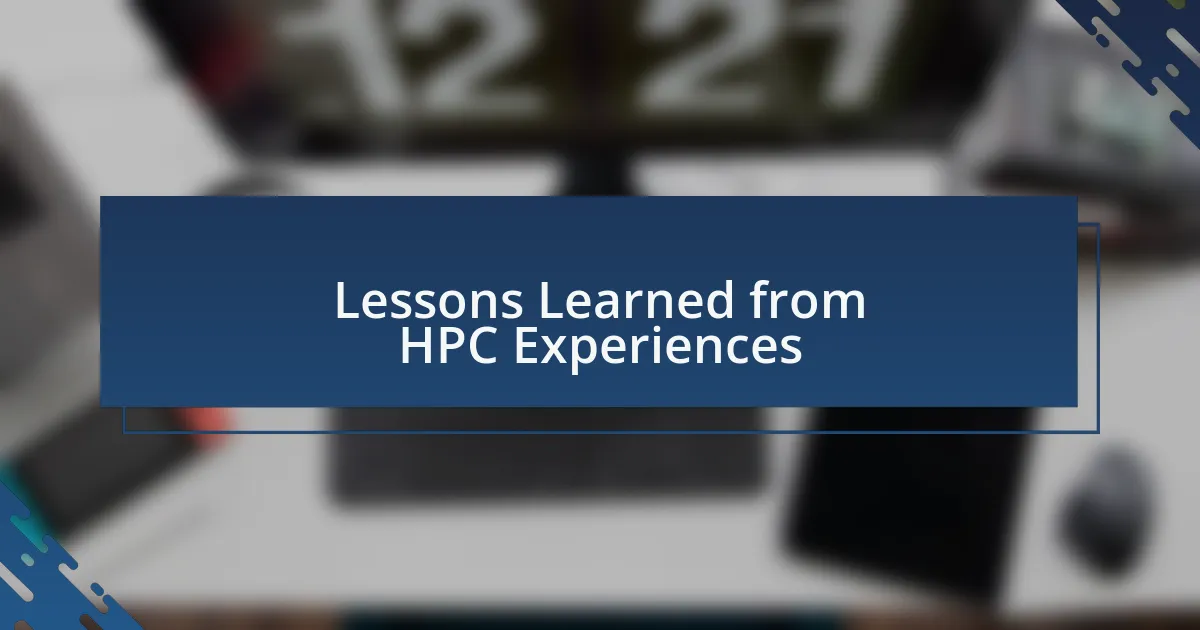
Lessons Learned from HPC Experiences
When reflecting on my experiences with HPC, I’ve come to realize the importance of adaptability. For instance, there was a time I was deeply entrenched in a complex modeling project that relied heavily on specific software tools. When an update caused unexpected incompatibilities, I had to swiftly pivot to alternative software. This taught me that flexibility is essential; sometimes, the path we plan can veer off course, and it’s our ability to adjust that defines success. Have you ever faced a similar crossroads?
Another lesson that stands out is the value of thorough testing. I remember running a large-scale computational analysis only to discover, after hours of processing, that fundamental assumptions in the model were incorrect. The frustration was palpable, but it drove home the message that rigorous testing throughout all phases of the project process is vital. It’s like building a house; you wouldn’t skip the foundation, would you? I’ve since adopted a more methodical approach, which saves time and resources in the long run.
Lastly, engaging with the HPC community has been a game-changer for my growth. I vividly recall attending a conference where a panel shared their trial-and-error stories with data-intensive tasks. Their candidness about failures and breakthroughs made me realize that we’re all in this together. It was refreshing to connect with others who face similar struggles. Have you ever found solace in shared experiences? It helps to remember that behind every successful project, there are moments of doubt and lessons learned.